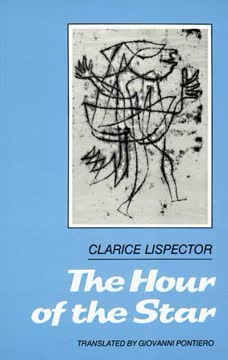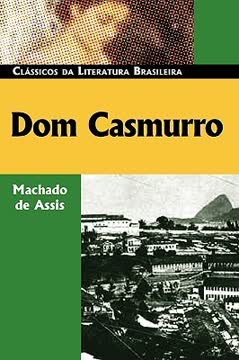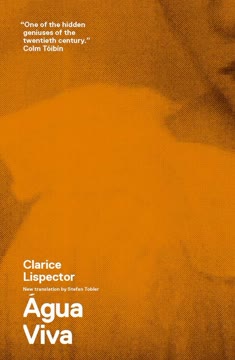Plot Summary
The Writer's Dilemma
Rodrigo S.M., the narrator, opens with a confession: he is both compelled and tormented by the act of writing. He wants to tell the story of a poor, anonymous girl from Brazil's Northeast, but is haunted by the inadequacy of words and the futility of narrative. He meditates on the nature of existence, the limits of empathy, and the impossibility of truly capturing another's life. The narrator's voice is self-conscious, oscillating between detachment and deep involvement, and he admits to feeling both pity and frustration for his subject. This chapter sets the tone for a story that is as much about the act of storytelling as it is about the life being told, inviting readers to question the boundaries between author, character, and reader.
A Girl Without Answers
The focus shifts to Macabéa, a nineteen-year-old typist living in Rio de Janeiro. Orphaned young and raised by a harsh aunt, she is unremarkable, poor, and almost invisible to those around her. Macabéa is described as inept at life, unable to protest or even fully understand her own suffering. She does not ask "Who am I?" because the question itself is too dangerous, too destabilizing. Her existence is marked by a lack of self-awareness and a passive acceptance of her fate. The narrator insists on her ordinariness, her lack of beauty, and her inability to attract attention or affection, setting her apart as a symbol of the forgotten and overlooked.
The Weight of Poverty
Macabéa's childhood in the backwoods of Alagoas is marked by deprivation, illness, and emotional neglect. Her aunt's cruelty is both physical and psychological, instilling in Macabéa a sense of unworthiness and resignation. Moving to Rio after her aunt's death, she finds herself in a crowded bedsit with other working girls, eking out a living as a typist despite her lack of skill. The city is indifferent, even hostile, and Macabéa's poverty is both material and existential. She is sustained by small rituals and habits, but her life is a daily negotiation with hunger, illness, and the threat of being discarded.
Anonymous in the City
In the bustling metropolis, Macabéa is a ghost among millions. She is ignored by her roommates, unnoticed by her employer, and overlooked by strangers. Her days are repetitive and uneventful, punctuated only by the sounds of the city—radios, traffic, the distant crowing of a cockerel. She finds solace in routine, collecting advertisements and listening to Radio Clock, which offers her snippets of information and a sense of order. Despite her anonymity, Macabéa clings to a fragile sense of happiness, convinced that simply being alive is enough, even if she is unsure what that means.
Faith and Emptiness
Macabéa's inner life is paradoxical: she is both empty and full of faith. She prays without knowing to whom, and her faith is not in God or any doctrine, but in the act of believing itself. This faith gives her a kind of grace, allowing her to endure humiliation and deprivation without bitterness. She is superstitious, impressionable, and easily influenced by others, but her innocence protects her from despair. The narrator marvels at her ability to find consolation in sadness and to accept her lot without complaint, suggesting that her emptiness is a form of abundance.
The Smallest Pleasures
Life offers Macabéa few pleasures: a cup of cold coffee before bed, a hard-boiled egg at a snack bar, a rainbow glimpsed on a dreary day. She collects advertisements for face cream, dreams of looking like Marilyn Monroe, and treasures the rare moments of solitude when she can dance alone in her room. These small joys are fleeting and often tinged with sadness, but they are enough to sustain her. Her happiness is not the result of fulfillment, but of a refusal to expect more from life than it can give.
A Brief Romance
In the rain, Macabéa meets Olímpico de Jesus, a fellow Northeasterner and metalworker. Their courtship is awkward and unsentimental, marked by misunderstandings and silences. Olímpico is ambitious, self-important, and ultimately self-serving, but Macabéa is grateful for his attention. She dreams of marriage and a better life, but their relationship is shallow and transactional. Olímpico is drawn to Macabéa's workmate Glória, whose vitality and confidence contrast sharply with Macabéa's meekness. The romance, such as it is, is doomed from the start, but for Macabéa, it is a rare taste of connection.
Dreams and Disappointments
Macabéa's dreams are modest: to be loved, to be noticed, to have a future. She is easily satisfied, but also easily hurt. Olímpico's betrayal—leaving her for Glória—devastates her, but she cannot fully articulate her pain. Instead, she laughs, unable to weep. Her sense of self is so fragile that even disappointment becomes a kind of affirmation: she exists, if only to be rejected. The narrator observes her suffering with a mixture of pity and frustration, recognizing in her the universal longing for recognition and the inevitability of loss.
Betrayal and Loneliness
After Olímpico leaves her, Macabéa is left with only Glória, who pities her but cannot truly understand her. Macabéa's loneliness deepens, but she continues to go through the motions of daily life. She buys herself a new lipstick, hoping to transform her appearance, but the effect is grotesque rather than glamorous. Her attempts at self-improvement are met with ridicule, and she retreats further into herself. The city remains indifferent, and Macabéa's isolation becomes complete.
The Search for Meaning
In the wake of her heartbreak, Macabéa visits a doctor, hoping for a cure for her persistent ailments. The doctor is indifferent, dismissing her symptoms as neurosis and prescribing a tonic she cannot afford. He is emblematic of a society that has no patience for the poor and the powerless. Macabéa's encounter with the medical system leaves her no better off, but she remains hopeful, convinced that something good must be waiting for her. Her search for meaning is both desperate and naïve, a testament to her resilience and her vulnerability.
The Doctor's Indifference
The doctor's examination of Macabéa is perfunctory and condescending. He sees her as a case, not a person, and his advice is useless to someone in her position. His own disillusionment mirrors the broader social indifference to suffering. Macabéa's inability to advocate for herself, combined with the doctor's lack of empathy, underscores the systemic barriers faced by the poor. The encounter leaves her unchanged, but the narrator's commentary reveals the deep chasm between those who suffer and those who are supposed to help.
Glória's World
Glória, Macabéa's coworker, is everything Macabéa is not: confident, sensual, and self-assured. She quickly replaces Macabéa in Olímpico's affections and offers Macabéa only superficial comfort. Glória's world is one of small luxuries and modest ambitions, but even these are out of reach for Macabéa. The contrast between the two women highlights the arbitrary nature of fortune and the ways in which society rewards certain traits while punishing others. Macabéa's inability to compete leaves her further marginalized.
The Fortune-Teller's Promise
At Glória's suggestion, Macabéa visits Madame Carlota, a flamboyant fortune-teller who promises her a dramatic change in fortune. Madame Carlota's reading is a performance, mixing pity with grandiose predictions: Macabéa will find love, wealth, and happiness. For the first time, Macabéa allows herself to hope for something more, her heart swelling with anticipation. The fortune-teller's words are intoxicating, offering Macabéa a vision of a future she never dared imagine. The narrator, however, hints at the cruel irony of such hope.
Hope and Transformation
Leaving Madame Carlota's apartment, Macabéa feels reborn. The promise of a better future fills her with a sense of possibility and self-worth she has never known. She walks through the city with new confidence, her mind alive with dreams of love and prosperity. The transformation is internal and fleeting, but for a brief moment, Macabéa experiences the fullness of life. The narrator lingers on this moment, aware of its fragility and the inevitability of disappointment.
The Hour Arrives
As Macabéa steps into the street, buoyed by hope, she is struck by a yellow Mercedes. The accident is sudden, brutal, and absurd—her life cut short at the very moment she feels most alive. The onlookers gather, indifferent and passive, as Macabéa lies dying. The narrator reflects on the randomness of fate and the indifference of the world to individual suffering. Macabéa's death is both tragic and inevitable, the culmination of a life lived on the margins.
The Final Silence
In her final moments, Macabéa experiences a sense of peace and fulfillment. She feels herself being born into death, her suffering transformed into a kind of grace. The narrator, too, is changed by her passing, recognizing in her story the universal struggle for meaning and dignity. The novel ends in silence, a meditation on the weight of existence and the fleeting nature of happiness. Macabéa's life, though small and overlooked, is revealed to be as significant as any other—a star that shines, however briefly, in the darkness.
Characters
Macabéa
Macabéa is a nineteen-year-old typist from the impoverished Northeast of Brazil, orphaned early and raised by a cruel aunt. She is physically frail, unattractive, and socially invisible, yet she possesses a quiet resilience and a capacity for faith that borders on the miraculous. Macabéa's psychological landscape is marked by emptiness, passivity, and a lack of self-awareness; she does not question her suffering or aspire to more than survival. Her relationships—with Olímpico, Glória, and the city itself—are characterized by longing and disappointment, but she endures with a kind of grace. Macabéa's development is subtle: her brief moments of hope and self-assertion are quickly extinguished, yet her story is a testament to the dignity of the overlooked and the power of endurance.
Rodrigo S.M. (The Narrator)
Rodrigo S.M. is both the narrator and a character, wrestling with the ethics and limitations of storytelling. He is deeply aware of his own privilege and the impossibility of truly representing Macabéa's experience. His narrative voice is by turns ironic, compassionate, and frustrated, oscillating between detachment and identification with his subject. Rodrigo's psychological struggle mirrors the existential questions at the heart of the novel: what does it mean to tell another's story, and can empathy bridge the gap between lives? His relationship to Macabéa is ambivalent—he pities her, resents her, and ultimately is transformed by her. Rodrigo's journey is one of self-examination, as he confronts his own complicity in the suffering he describes.
Olímpico de Jesus
Olímpico is a metalworker from the Northeast, like Macabéa, but he is her opposite in temperament and ambition. He is brash, self-important, and determined to escape his origins through cunning and self-advancement. Olímpico's relationship with Macabéa is transactional and ultimately exploitative; he abandons her for Glória, whom he perceives as a better prospect. Psychologically, Olímpico is driven by insecurity and a need for validation, masking his vulnerability with bravado. His development is limited—he remains focused on his own survival, indifferent to the suffering of others.
Glória
Glória is Macabéa's coworker and eventual rival for Olímpico's affections. She is everything Macabéa is not: physically robust, self-assured, and socially adept. Glória's world is one of small comforts and practical ambitions, and she navigates life with a sense of entitlement and resourcefulness. Her relationship with Macabéa is tinged with pity and condescension; she offers superficial support but cannot bridge the gulf between their experiences. Glória's psychological strength is rooted in her ability to adapt and assert herself, but her empathy is limited.
Madame Carlota
Madame Carlota is a former prostitute turned fortune-teller, whose performance offers Macabéa a fleeting sense of hope and possibility. She is larger-than-life, both nurturing and exploitative, using her charisma to manipulate her clients' desires. Madame Carlota's reading of Macabéa's future is both a kindness and a cruel joke, offering comfort while reinforcing the illusions that sustain the powerless. Psychologically, she is pragmatic and self-interested, but her interaction with Macabéa reveals a capacity for empathy, however transactional.
The Doctor
The doctor who examines Macabéa is emblematic of institutional neglect. He is perfunctory, dismissive, and more concerned with his own frustrations than with his patient's suffering. His lack of empathy reflects the broader social indifference to the poor, and his advice is useless to someone in Macabéa's position. Psychologically, he is resigned and cynical, having lost any sense of vocation or purpose.
Macabéa's Aunt
Macabéa's aunt is her only guardian after her parents' death, raising her with a mixture of cruelty and neglect. She instills in Macabéa a sense of unworthiness and resignation, shaping her passivity and lack of self-esteem. The aunt's psychological rigidity and repression are projected onto Macabéa, who internalizes her aunt's harsh judgments and low expectations.
The Four Marias
The four women with whom Macabéa shares her bedsit are largely indistinguishable, representing the faceless masses of the urban poor. Their presence underscores Macabéa's anonymity and the interchangeability of suffering in the city. They are exhausted, indifferent, and preoccupied with their own survival, offering neither friendship nor support.
Senhor Raimundo
Macabéa's boss is a minor but telling figure: he is indifferent to her struggles, focused on efficiency and order. His occasional moments of leniency are motivated more by convenience than compassion. He represents the impersonal forces of the workplace and the broader indifference of society to individual suffering.
The Fiddler
The fiddler appears at the end of the novel, playing a dirge as Macabéa lies dying. He is a figure from the narrator's childhood, embodying the persistence of sorrow and the universality of suffering. His music is both a lament and a benediction, marking the transition from life to death and underscoring the novel's themes of loss and transcendence.
Plot Devices
Metafiction and Narrative Intrusion
The novel is structured as a metafictional meditation, with Rodrigo S.M. constantly interrupting the narrative to reflect on his own role as storyteller. This device blurs the boundaries between author, narrator, and character, inviting readers to question the nature of fiction and the ethics of representation. The narrative is fragmented, recursive, and self-referential, mirroring the uncertainty and instability of Macabéa's existence. The use of direct address, digressions, and philosophical asides creates a sense of intimacy and immediacy, while also highlighting the limitations of language and empathy.
Symbolism and Foreshadowing
The novel is rich in symbolism: the recurring motif of stars, the color yellow, the cockerel's crow, and the advertisements Macabéa collects all serve as metaphors for hope, longing, and the search for meaning. The fortune-teller's prophecy foreshadows Macabéa's tragic end, while the city itself is both a setting and a character, embodying the forces of anonymity and indifference. The use of foreshadowing heightens the sense of inevitability and underscores the novel's existential themes.
Fragmented Structure and Repetition
The story unfolds in fragments, with repeated phrases, images, and motifs creating a sense of circularity and stasis. This structure reflects both Macabéa's repetitive, uneventful life and the narrator's struggle to impose order on chaos. The repetition of certain words and ideas—emptiness, faith, invisibility—reinforces the novel's central concerns and creates a rhythm that is both hypnotic and unsettling.
Analysis
Clarice Lispector's The Hour of the Star is a profound meditation on poverty, invisibility, and the search for meaning in a world that is indifferent to suffering. Through the story of Macabéa—a young woman whose life is defined by deprivation, anonymity, and a stubborn faith in the face of adversity—Lispector explores the existential questions that haunt both individuals and societies. The novel's metafictional structure, with its self-conscious narrator and fragmented narrative, challenges readers to confront the limitations of empathy and the ethics of storytelling. Macabéa's brief moments of hope and self-assertion are both heartbreaking and illuminating, revealing the dignity and resilience of those who are overlooked and forgotten. The novel's ending, with its abrupt violence and final silence, forces us to reckon with the fragility of life and the persistence of longing. Ultimately, The Hour of the Star is a call to recognize the humanity in every life, no matter how small or insignificant it may seem, and to question the systems that render so many invisible.
Last updated:
Review Summary
The Hour of the Star is a unique, philosophical novella that explores the life of Macabéa, a poor, naive woman from northeastern Brazil. Narrated by a male writer, the story delves into themes of identity, poverty, and existence. Readers appreciate Lispector's poetic prose, meta-narrative style, and ability to create a haunting tale within a short work. The book is seen as a feminist manifesto and a critique of societal norms. While some find it challenging, many consider it a masterpiece of Brazilian literature.
Similar Books
Download PDF
Download EPUB
.epub digital book format is ideal for reading ebooks on phones, tablets, and e-readers.







